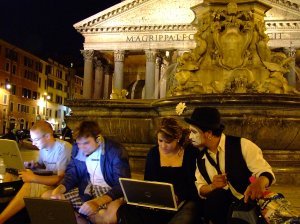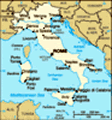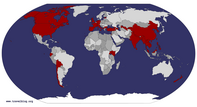Advertisement
Published: June 19th 2008

 A sign of our times?
A sign of our times?
People checking their facebook's in front of The Pantheon, RomeAbout three years ago I walked into an Internet Café in Madras with a terrible affliction. I’d been on the road for most of my adult life and was now free and single for the first time in years, and could see no end in sight. With the last ties now severed, I was cast loose and ‘freedom from’ gave way to the uncertainty of ‘freedom to’. Yet with no clear replacement for the life I’d become accustomed to, the future seemed to lack meaning and direction.
Powerful urges accumulate, tempting you to retreat from freedom. Firstly in the small things; sleeping in the same bed every night, the train arriving on time and not having to negotiate the price of your meal etc… Then after a while, once you begin to tire and jade, you even begin to miss the nine to five; the structured day in which you can relieve yourself the burden of independence and uncertainty...
Simultaneously the freer you become, the more you begin to notice the shackles holding you back, and the fact that you can only be "free" when you have the means to sustain yourself. And so this inevitable ‘return’ from freedom
to earn more money, is at the same time both a psychological burden and a source of comfort; the very impermanent nature of this pseudo-freedom serves to placate a restless soul until the next time the money runs out.
Economic freedom would mean freedom from the economy -- from being controlled by economic forces and relationships; freedom from the daily struggle for existence, from earning a living. Political freedom would mean liberation of the individuals from politics over which they have no effective control. Similarly, intellectual freedom would mean the restoration of individual thought now absorbed by mass communication and indoctrination, abolition of 'public opinion' together with its makers. The unrealistic sound of these propositions is indicative, not of their utopian character, but of the strength of the forces which prevent their realization
(Marcuse, One Dimensional Man) Over forty years ago a 17 year old boy was hitching to Greece when he got a lift going to Baghdad, so he decided to go there instead. He stayed in Baghdad for a year, then briefly returned to England before setting off again for another seven years. Two years in North West Bengal, Assam, Bhutan and northern Burma (where he travelled with two horses and a dog) and five years in India.
If anyone had the antidote to this terrible wonderful affliction I thought, it was my ex-professor. And so I emailed him with my concerns:
“Keep trucking ‘til you feel ripe to come home, and not a minute before. You'll recognise the feeling when it comes along. Trust it,” He answered.
… so without the onus on myself, the psychological comfort of knowing I'd eventually gravitate towards a more established existence fortified me with renewed zeal, and I
kept on trucking, always it seemed, one step ahead of the 'ripening'...
Until now...
Jen has lived in Rome, and speaks Italian, which is why it is me who stands amid Roma Termini's mêlée minding our mound of luggage, while she goes off in search for somewhere for us to stay. It quickly dawns on me that I must look as though I’ve just stepped off a cruise ship, because I’m being uncharacteristically eyed by not one, but a whole selection of undesirables, who make a nice living preying on the weak or unawares in such situations. After an initial period of surprise the adrenalin kicks in behind the tan and dark sunglasses and I get a little tingle. Unfortunately for action fans, confidence emits a slightly different smell to fear, and the opportunists melted back into the scenery.
We decide on a hostel about two blocks from the station and after dealing with the receptionist and checking into our dorm we both share the same thought. After having spent the previous fortnight immersed in smiling faces and cordial greetings, the idea of someone failing to smile enthusiastically as we listed our desires was clearly a sign
of hostility.
Conversely, exhilarated by our newfound freedom, we set out to explore the city under our own steam, without curfews and time limits. Our first stop was the market, where we assembled the rations for our uninhibited wandering. Even after the excesses of cruising it is testament to Italian cuisine that we could still walk around in awe and leave with a whole basket of divinities. Jennifer played personal tour guide, allowing us to hit the highlights whilst peppering our experience with picnics in some less-visited areas of the city and pit-stops in a whole host of gelaterias.
In the eternal city it is impossible to escape the past, and the more past it seems, the more tourists and trinket sellers, creating an abstraction too surreal for any appreciation or understanding of the macaronic sights you pass on by. Men dressed as gladiators pose for pictures outside the Coliseum in attempt to create a more ‘authentic’ experience. Local stall holders fight with Bangladeshi upstarts attempting to cut in on a deal, and surrounded by whirlwinds of tourist activity it seems as though everyone you meet is the result of a business transaction, trying to sell you a
ticket, a tour, or a trinket.
Much of a traveler's time is spent wading through these seas for one’s own unobstructed personal memento of a millennia-old marvel, or a quiet moment to reflect on the human effort required to complete these pre-industrial masterpieces. Add to that the enormity of steeping oneself in art and history lessons in order to appreciate the sights, and it’s almost inevitable that contemporary culture and the presence of everyday Romans fade into the background.
Meanwhile, with four times the number of tourists visiting annually as city residents, it is impossible for your average Roman to escape the eternal fixture of the tourist, and conversely we, too, start to blend into the backdrop like road construction, building renovations, and other omnipresent yet continually shifting nuisances. For those who don’t have anything to gain from our presence, tourists are, at the worst, lamented for congesting narrow streets and passageways, and, at best, completely invisible.
Of course, this oversimplifies reality and takes away from the warmth of Italians at large and the intrigue of the tourist population. Speaking the language and veering into neighborhoods with no attractions on offer, one can easily strike up meaningful
conversations and experience an entirely different city than that of the Forums and Renaissance art. Yet ironically, tourism in the world’s cultural hotpsots has become an immersion into the culture of statues, paintings, temples, cathedrals, architecture, and all the other nonliving roots of civilization, while a wedge is driven between that which actually effectuates civilization; the people.
As we arrived at the Trevi Fountain just after dusk, the place was positively heaving with people, busy taking pictures and tossing coins. A tradition that used to ensure a return to Rome, now apparently constitutes luck for the individual who throws three coins with their right hand over their left shoulder. Approximately 3,000 Euros are thrown into the fountain each day, giving some indication of the amount of photographs taken.
Jennifer observed that since the advent of digital cameras, people seem to linger a lot longer, taking a dozen or so pictures when before they would settle for two or three…I reflected that perhaps over the last five years or so we have all become that iconic parody of the Japanese tourist of lore, marching around snapping at everything we see, living our lives vicariously through our lenses.
On

 Feeding the Pigeons
Feeding the Pigeons
Piazza San Marco, Veniceour last evening in Rome, hauling our bags the two blocks back to the train station, they’d never felt heavier in all my travels. During my time in Rome I had felt removed from those with whom we share the world, and they doubtless removed from me. Travel had become an abstraction and a frustration, and at that very moment, for the first time in my life, I felt ripe.
We arrived on the platform in plenty of time having caught the last subway train and as our train to Venezia was delayed we decided to unpack our delicatessen provisions and have a little picnic. Thirty or so youths arrived on the opposite platform, presumably fresh from a football match, singing and chanting to us and a couple of resident station guards, as we sat gnawing our way through pieces of sausage and bread.
When the train did eventually arrive from Naples, some two hours late, it was a shambles. As we hauled our luggage collection through the darkened narrow corridors, it seemed as though all the compartments were full to capacity, and without a designated seat number our search spanned almost the entire length of the train.
Meanwhile, guards from the station, together with local police, had boarded and starting hauling off passengers who didn’t have tickets, further delaying our departure.
We eventually found a compartment with two available seats, squeezed in our luggage wherever we could and attempted to make ourselves comfortable in the darkness for the trip to Venice. My neck was given the unenviable task of straining to maintain at least a six inch gap between my nose and someone’s foot, ‘Give me Indian trains any day’, I thought, and for the second time in almost as many hours I felt ripe.
Call me a Luddite, but most of my European travel was done before hostelbookers.com, and as a result I’ve never been one to book ahead; assuming, quite assuredly, that if you arrive at your destination before breakfast you’re guaranteed to find a room. Much to my chagrin the other 57,000 million tourists in Venice that day had obviously cottoned on to this new technological advance and it was in vain we queued at the tourist information office inside the station to be told there was no available accommodation … The goalposts had clearly moved, and we were forced into a
reflective retreat from Venice on the next local train outta-there, as a slightly bitter tasting ripeness washed over me.
Another bus ride down the coast, and we were indulging in a well-earned refresher nap in a cabin at a campsite, worlds away from Venice. Upon waking we were pleased to discover that a ferry docked here on her way into Venice. Having only ever seen Venice from the inside of her train station, this was my first true glimpse of the city...in such circumstances it is easy to believe in fate, because there can be no more romantic way to arrive in Venice than by boat across the Venetian Lagoon, the way it would have doubtless been seen by Marco Polo after returning from his epic voyage.
Venice made its wealth predominantly from trading with the Islamic world, and by the late thirteenth century, Venice was the most prosperous city in all of Europe. This wealth meant that Venice's leading Jones’ began competing with each other to build the grandest palaces, employing the work of the greatest artists of the time.
Venetian merchants and soldiers pilfered whatever they could lay their hands on from the east and
what couldn’t be carried, bought or stolen came back in their heads. This trade in art and ideas brought together unconnected bits and pieces from down the ages into a spectacular man-made, yet almost organic masterpiece of engineering and grace. The atmosphere both invigorating and sublime. And as with all great destinations, inspiration can be found not just at the main attractions, but wherever you may wander.
It felt like something from the kind of fantasy novel I’d never bother to read; the sheer grandeur and decadence too much to be tangible, the kind of profligate wealth seen nowadays only at some Sheikh’s Palace in the oil-soaked Middle East. Made all the more impalpable by the fact that it’s a functioning city in the 21st century entirely without motorcars.
Up until my arrival in Venice I had felt a hand gripping at my shoulder, weighing me down, pulling me home. The ripeness that I had at times looked towards for a reason to quit travelling had visited me with vengeance.
In retrospect, my Roma ripening was nothing but a hangover from a fortnight being spoilt on a cruise ship. I'd simply become a pampered body housing a
restless soul - who ain’t seen nothing yet...

Advertisement
Tot: 0.046s; Tpl: 0.013s; cc: 10; qc: 24; dbt: 0.0159s; 1; m:domysql w:travelblog (10.17.0.13); sld: 1;
; mem: 1.1mb



























Tim Johnson
non-member comment
You don't know me, but just happenned across your Blog. Some really beautiful camerawork and words. I can really associate with your feelings about freedom at the start. My only contribution to this would be, if we can achieve intellectual freedom inside, then would the other two forms of freedom mentioned (political and economic) necessarily follow?